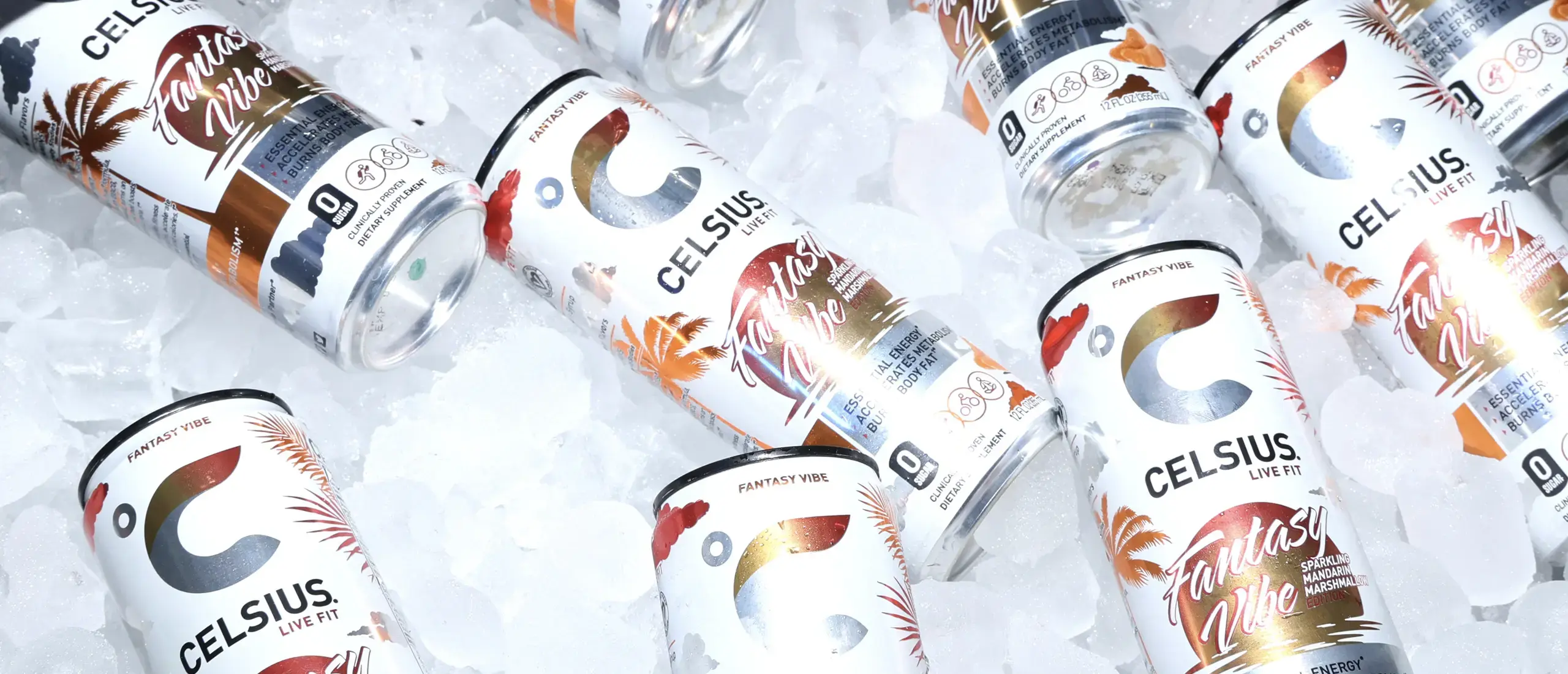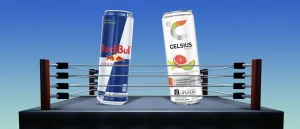Is Celsius Energy Drink Bad for You?
- By Taneia Surles, MPH
- February 12, 2024
10-Second Takeaway
After reviewing the science behind the drink’s ingredients and nutritional value, we believe this is a healthier energy drink than most, but, because of its very high caffeine content, not something you want to rely on regularly.
Many of us love energy drinks for the quick energy boost they deliver. However, we know they are, generally speaking, not good for us due to ingredients like artificial sweeteners, artificial flavors, and added sugars (1). One brand that claims to provide a “healthier” energy drink is Celsius, but is it any better than a Red Bull or Monster?
We dove into Celsius’s ingredients and nutritional content to determine whether this drink is good for your health.
Our Experience
Hone Health is a team of health-obsessed journalists, editors, fitness junkies, medical reviewers, and product testers. To ensure we deliver you research-backed information on the Celsius energy drinks, we reviewed several research studies and well-respected medical pages for insight.
What Is Celsius Energy Drink?
So, what’s the deal with these Celsius drinks? They claim to have a clinically-proven formula that can boost your metabolism and help you burn body fat while exercising. But they’re also helpful for just getting you through the workday.
The brand’s formula contains several healthy ingredients, so you won’t feel super icky. The drinks are also free of artificial preservatives or flavors, aspartame, and high fructose corn syrup.
That said, let’s break down some of Celsius’s key ingredients.
Celsius Ingredients
We’re going to break down the key ingredients in a can of Celsius, but first, here’s the full list:
- Caffeine
- B vitamins (B6, B12, niacin, and pantothenate)
- Biotin
- Riboflavin
- Vitamin C
- Calcium carbonate
- Chromium
- Sodium
- Carbonated filtered water
- Citric acid
- Sucralose
- Taurine
- Green tea leaf extract
- Guarana extract
- Glucuronolactone
- Ginger extract
Key ingredients
Taurine
Taurine is one of the prominent ingredients featured in these energy drinks. It is an essential amino acid produced in the body and found in several foods and drinks. Taurine can support nerve growth, maintain proper hydration, and produce bile salts, which can help digestion (2).
Taurine may improve heart function, prevent heart disease, manage diabetes, and increase exercise performance (2).
It’s challenging to assess the safety of taurine, as adverse reactions to it are more often studied as a group with other ingredients in energy drinks—guarana seed extract, different sweeteners, ginseng, caffeine, and so on (2).
Guarana extract
Guarana is an extract of seeds from the plant Paullinia cupana from the Amazon Basin. It contains components like caffeine, theophylline, and theobromine—all alkaloids that can affect the central nervous system (3). Guarana extract is also a stimulant and tonic that can treat fatigue and decrease appetite and thirst (3).
Several research studies have found that guarana has several benefits, such as improving energy, promoting weight loss, and relieving pain. (3, 4, 5).
If you consume too much guarana extract (loosely defined as more than 1000mg daily), you may be at risk of symptoms like tremors, jitteriness, agitation, confusion, hypertension, and dehydration (3). But it should be noted that researched daily dose has ranged from 200 to 1000mg, which is a significant gap.
Ginger extract
Ginger extract is another natural ingredient that stands out in this beverage. It is a plant-based spice derived from the root of the Zingiber officinale plant. The spice contains anti-inflammatory properties that may improve your health (6).
Some benefits of ginger root extract include soothing your digestive system, protecting your immune system, and even preventing certain chronic diseases, such as hypertension and congenital heart disease (CHD) (6).
Ginger root extract is safe to consume in moderate amounts, but high doses may increase the risk of bleeding (7), most notably in people already taking blood thinners.
Green tea leaf extract
The green tea leaf extract is derived from the Camellia sinensis plant (8). It contains several polyphenols, which are plant compounds with antioxidant properties, which are beneficial for your health in numerous ways (9).
Research shows that consuming green tea leaf extract may lower blood cholesterol levels, reduce blood pressure, protect the immune system, improve oral health, reduce inflammation, and might even lower the risk of certain cancers (10).
Because green tea extract contains caffeine, it can cause unpleasant symptoms like anxiety, tremors, irritability, or sleeping difficulties. Yet, you’re more likely to experience these if you’re sensitive to caffeine or take green tea in high doses (8).
We think it’s safe to say that these are some of the “healthier” energy drinks on the market.
Celsius Nutritional Value
We’ll break down the key nutritional info in a can of Celsius, but first, here’s the full nutritional value in each can:
- 10 calories
- 200mg caffeine
- 0g total fat
- 5mg sodium
- 50mcg calcium
- 60mg vitamin C
- 1.7mg riboflavin
- 20mg niacin
- 2mg vitamin B6
- 6 micrograms of vitamin B12
- 300 micrograms of biotin
- 10mg pantothenic acid
- 50 micrograms of chromium
Key nutritional info
Vitamin B6
A 12-fluid-ounce Celsius energy drink contains 2 milligrams of vitamin B6 with a 120% daily value. Daily value, or DV, is how much nutrient is within a single serving of a food or drink (11). You’ll get a nice dose of this essential vitamin in this drink, as you only need around 1.3 milligrams daily (12).
Vitamin B6 is a water-soluble vitamin naturally present or added to foods or taken as a dietary supplement. This nutrient is responsible for performing a variety of functions in the body, such as metabolizing amino acids and carbohydrates, creating blood cells, and maintaining cell health (12).
Due it contains antioxidant and anti-inflammatory properties, vitamin B6 provides several health benefits, which include the following (13):
- Preventing and treating anemia
- Improving mood
- Improving brain health
- Protecting your health
- Lowering your risk of cancer
- Lowering your risk of eye disease
Vitamin B12
Like vitamin B6, the Celsius energy drink contains a large amount of vitamin B12 at 6 micrograms, which equals 250 percent DV. Vitamin B12 is a water-soluble vitamin found in certain foods and as a dietary supplement. The nutrient is responsible for maintaining the development and function of the central nervous system, forming healthy red blood cells, and facilitating DNA synthesis (14).
Vitamin B12 may improve brain function and boost your energy levels (15).
If you take the vitamin in average doses, you may be safe from unwanted side effects. However, higher doses of vitamin B12 may lead to symptoms like headaches, fatigue, nausea, vomiting, diarrhea, and tingling in the hands and feet. Daily recommended intake is just 2.4mcg, but higher levels of consumption have been found to be safe. That said, most of the potential negative side effects should only emerge when supplementing B12 for severe B12 deficiency (16).
Vitamin C
Good ol’ vitamin C is another distinct nutrient, with each Celsius drink containing 60mg or 70 percent of daily value. You’re likely familiar with vitamin C, but if you’ve forgotten, it is an essential nutrient found in various foods and offered as a supplement. It is an antioxidant that can protect your body from free radicals, which can play a role in developing chronic diseases like heart disease and cancer (17).
Vitamin C can aid in wound healing and scar tissue formation, repair and maintain cartilage, bones, and teeth, and help with iron absorption (18).
Chromium
Chromium is one of the ingredients that truly makes Celsius energy drinks unique. One drink contains 50mcg or 140 percent DV of chromium. Like all other nutrients, it is naturally present in foods and as a dietary supplement. Chromium might be responsible for metabolizing carbohydrates, lipids, and proteins to initiate insulin activity, but there’s a need for additional research to confirm (19).
Some supposed benefits of chromium include promoting healthy blood glucose and blood pressure levels, improving lean body mass by suppressing appetite, and increasing energy levels (20).
Is Celsius Bad for You?
After reviewing the ingredients and nutritional value of Celsius drinks, we think it’s safe to say that these are some of the “healthier” energy drinks on the market. Their unique formula can boost energy levels and may improve overall health. When it comes to any energy drink it is important to be mindful of unwanted side effects and always consult with your medical provider if needed.
References
-
UC Davis Department of Nutrition. Nutrition & health info sheets for consumers – energy drinks. https://nutrition.ucdavis.edu/outreach/nutr-health-info-sheets/consumer-energy-drinks
-
Cleveland Clinic (2023). A quick tour of taurine. https://health.clevelandclinic.org/taurine
-
National Library of Medicine (2023). Guarana. https://www.ncbi.nlm.nih.gov/books/NBK589113/
-
Bortolin, R.C. et al (2019). Guarana supplementation attenuated obesity, insulin resistance, and adipokines dysregulation induced by a standardized human Western diet via brown adipose tissue activation. https://pubmed.ncbi.nlm.nih.gov/30868680/
-
Santana, A.L. et al (2018). Health and technological aspects of methylxanthines and polyphenols from guarana: A review. https://www.sciencedirect.com/science/article/pii/S1756464618302652
-
Modi, M. et al (2022). Ginger root. https://www.ncbi.nlm.nih.gov/books/NBK565886/#
-
Johns Hopkins Medicine. Ginger benefits. https://www.hopkinsmedicine.org/health/wellness-and-prevention/ginger-benefits
-
University of Rochester Medical Center. Green tea extract. https://www.urmc.rochester.edu/encyclopedia/content.aspx?contenttypeid=19&contentid=greenteaextract
-
Rana, M. et al (2022). Health benefits of polyphenols: A concise review. https://pubmed.ncbi.nlm.nih.gov/35694805/
-
Reygaert, W.C. et al (2017). An update on the health benefits of green tea. https://www.mdpi.com/2306-5710/3/1/6
-
U.S. Food and Drug Administration (FDA) (2023). Daily value on the nutrition and supplement facts labels. https://www.fda.gov/food/nutrition-facts-label/daily-value-nutrition-and-supplement-facts-labels
-
National Institutes of Health Office of Dietary Supplements (NIH) (2023). Vitamin B6. https://ods.od.nih.gov/factsheets/VitaminB6-HealthProfessional/
-
Cleveland Clinic (2022). Top 7 benefits of vitamin B6. https://health.clevelandclinic.org/vitamin-b6
-
National Institutes of Health Office of Dietary Supplements (NIH) (2023). Vitamin B12. https://ods.od.nih.gov/factsheets/VitaminB12-HealthProfessional/
-
Cleveland Clinic (2022). Vitamin B12 benefits and best sources. https://health.clevelandclinic.org/vitamin-b12
-
Mayo Clinic (2023). Vitamin B-12. https://www.mayoclinic.org/drugs-supplements-vitamin-b12/art-20363663
-
Mayo Clinic. (2023). Vitamin C. https://www.mayoclinic.org/drugs-supplements-vitamin-c/art-20363932#
-
MedlinePlus (2023). Vitamin C. https://medlineplus.gov/ency/article/002404.htm
-
National Institutes of Health Office of Dietary Supplements (NIH) (2022). Chromium. https://ods.od.nih.gov/factsheets/Chromium-HealthProfessional/
-
Swaroop, A. et al (2019). Chapter 8 – Benefits of chromium (III) complexes in animal and human health. https://www.sciencedirect.com/science/article/abs/pii/B9780444641212000088














